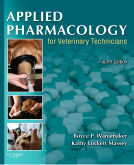|
|
|
| |
 |
|
|

|
 推薦指數:
推薦指數:





|
|
- 內容介紹
|
Applied Pharmacology for Veterinary Technicians, 4th Edition
By Boyce P. Wanamaker, DVM, MS and Kathy Massey, LVMT
504 pages 150 ills
Trim size 7 1/2 X 9 1/4 in
Copyright 2009
Description
Designed specifically for veterinary technicians, this essential resource offers detailed guidance on key topics such as managing medication inventory, dispensing veterinarian prescribed drugs, calculating drug dosages, administering medications to animals, and educating clients about drug side effects and precautions. Up-to-date drug information is presented in a consistent, easy-to-use format that includes pharmacokinetics, pharmacodynamics, clinical uses, dosage forms, and adverse side effects. Illustrated, step-by-step procedures demonstrate proper administration techniques for common drug forms.
Key Features
Like getting two books in one, this resource combines the comprehensiveness of a veterinary pharmacology text with coverage of pharmacologic fundamentals that are essential to veterinary technician practice.
Learning Objectives at the beginning of each chapter help you focus your study efforts and check your progress as you work through the material.
Chapter outlines provide at-a-glance overviews of the topics featured in each chapter, making it quick and easy to find information.
Key Terms lists with definitions familiarize you with the terminology used in each chapter.
Technician’s Notes boxes throughout the book provide useful hints and important reminders to help you avoid common errors and increase your efficiency.
Coverage of inventory control offers practical tips on performing this important task, including understanding the different vendor types, communicating with sales representatives, and using veterinary practice management computer software.
Detailed summaries of important drug laws, such as the Animal Medicinal Drug Use Clarification Act and the Animal Drug Availability Act, introduce you to the legal and ethical aspects of veterinary pharmacology.
New to this Edition
A companion Evolve website offers 137 photographs of drug labels to familiarize you with the labels you will see in practice, six drug dosage calculators with related exercises to help you strengthen your drug calculation skills, and 12 videos that show you how to administer oral, inhaled, and injectable drugs.
Proprietary drug names are listed along with generic names to help you learn to recognize drugs with generic options.
Additional review questions in this edition help reinforce your understanding of key concepts. Answers are located in the back of the book so you can check the accuracy of your responses.
The chapter on Drugs Used in Skin Disorders offers expanded coverage of the anatomy and physiology of the skin, as well as information on the latest drugs used to treat skin disorders.
Table of Contents
1. General Pharmacology
2. Routes and Techniques of Drug Administration
3. Practical Calculations in Pharmacology
4. Drugs Used in Nervous System Disorders
5. Drugs Used in Respiratory System Disorders
6. Drugs Used in Renal and Urinary Tract Disorders
7. Drugs Used in Cardiovascular System Disorders
8. Drugs Used in Gastrointestinal System Disorders
9. Drugs Used in Hormonal, Endocrine, and Reproductive Disorders
10. Drugs Used in Ophthalmic and Otic Disorders
11. Drugs Used in Skin Disorders
12. Antiinfective Drugs
13. Antiparasitic Drugs
14. Drugs Used to Relieve Pain and Inflammation
15. Therapeutic Nutritional, Fluid, and Electrolyte Replacements
16. Blood-Modifying, Antineoplastic, and Immunosuppressant Drugs
17. Miscellaneous Therapeutic Agents
18. Veterinary Technician’s Role
Appendix A: Common Abbreviations Used in Veterinary Medicine
Appendix B: Weights and Measures
Appendix C: Resource Information
Appendix D: Controlled Substances Information Summary
Bibliography
Review Question Answers
|
|
|

